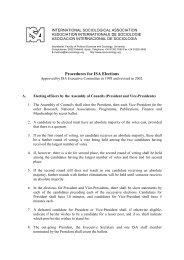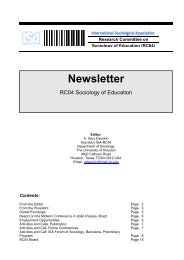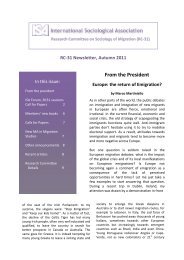Join us in Göteborg, Sweden for the 2010 ISA World Congress ...
Join us in Göteborg, Sweden for the 2010 ISA World Congress ...
Join us in Göteborg, Sweden for the 2010 ISA World Congress ...
Create successful ePaper yourself
Turn your PDF publications into a flip-book with our unique Google optimized e-Paper software.
RC09 Newsletter<br />
W<strong>in</strong>ter 2009<br />
Remarks from <strong>the</strong> RC09 Chairs<br />
Inside this issue:<br />
Dear colleagues,<br />
Greet<strong>in</strong>gs from RC09: Social Trans<strong>for</strong>mations<br />
and Sociology of Development!<br />
The core of <strong>the</strong> Newsletter be<strong>for</strong>e you<br />
provides a program overview of RC09<br />
sessions at <strong>the</strong> next <strong>World</strong> <strong>Congress</strong> of<br />
Sociology <strong>in</strong> <strong>Göteborg</strong> <strong>in</strong> <strong>2010</strong>. While prepar<strong>in</strong>g<br />
<strong>the</strong> <strong>Göteborg</strong> program, <strong>the</strong> RC09<br />
Board was conv<strong>in</strong>ced that we should try to<br />
foc<strong>us</strong> on some of <strong>the</strong> ma<strong>in</strong> sociological<br />
questions that <strong>the</strong> f<strong>in</strong>ancial crises of <strong>the</strong><br />
second half of 2008 had <strong>for</strong>ced <strong>us</strong> to consider.<br />
There<strong>for</strong>e, we have suggested several<br />
session topics, which look <strong>for</strong> scientific<br />
contributions analyz<strong>in</strong>g <strong>the</strong> current crises<br />
but also th<strong>in</strong>k about how we could <strong>in</strong>fluence<br />
policy debates and contribute to <strong>the</strong><br />
improvement of life conditions <strong>in</strong> our<br />
global world. We are conv<strong>in</strong>ced that <strong>the</strong><br />
social trans<strong>for</strong>mations that we have begun<br />
to perceive at <strong>the</strong> end of 2008 <strong>for</strong>m a productive<br />
challenge <strong>for</strong> <strong>the</strong> research agenda<br />
of RC09. We also believe that sociologists<br />
are ready to accept this challenge and are<br />
well-equipped to study it.<br />
We <strong>the</strong>re<strong>for</strong>e <strong>in</strong>vite you, RC09 members<br />
from all over <strong>the</strong> world, to apply <strong>the</strong> tools<br />
of social scientific <strong>in</strong>quiry to what is go<strong>in</strong>g<br />
on around <strong>us</strong> and respond to our Goteborg<br />
call <strong>for</strong> paper proposals with contributions<br />
reflect<strong>in</strong>g on <strong>the</strong> current socioeconomic<br />
issues. We encourage you to<br />
foc<strong>us</strong> on concrete situations that can be<br />
studied empirically <strong>in</strong> given groups or regions<br />
and reflect on <strong>the</strong>oretical approaches<br />
that help <strong>us</strong> analyze <strong>the</strong>se changes. We<br />
hope that you will f<strong>in</strong>d <strong>the</strong> variety of <strong>the</strong><br />
RC09 program sessions stimulat<strong>in</strong>g and<br />
look <strong>for</strong>ward to receiv<strong>in</strong>g your proposals.<br />
In this Newsletter, we have also cont<strong>in</strong>ued<br />
with our tradition to provide some<br />
reviews on publications <strong>in</strong> <strong>the</strong> area of social<br />
trans<strong>for</strong>mations and sociology of development.<br />
We are also very pleased to provide<br />
a list<strong>in</strong>g of several new publications by<br />
RC09 members. We thank those who submitted<br />
<strong>the</strong>se and hope to receive more <strong>in</strong><br />
<strong>the</strong> future. We are also grateful to Wade<br />
Roberts <strong>for</strong> putt<strong>in</strong>g this Newsletter toge<strong>the</strong>r.<br />
With best wishes, until our next Newsletter<br />
issue,<br />
N<strong>in</strong>a Bandelj and Ulrike Schuerkens<br />
Co-chairs of RC 09<br />
Remarks from <strong>the</strong><br />
RC09 Chairs<br />
XVII <strong>ISA</strong> <strong>2010</strong> <strong>World</strong><br />
<strong>Congress</strong> In<strong>for</strong>mation<br />
Call <strong>for</strong> Papers 3-5<br />
Member Publications 6-8<br />
Book Reviews 9-10<br />
RC09 In<strong>for</strong>mation 11<br />
<strong>Jo<strong>in</strong></strong> <strong>us</strong> <strong>in</strong> <strong>Göteborg</strong>, <strong>Sweden</strong> <strong>for</strong> <strong>the</strong><br />
<strong>2010</strong> <strong>ISA</strong> <strong>World</strong> <strong>Congress</strong><br />
“Sociology on <strong>the</strong> move”<br />
See <strong>in</strong>side <strong>for</strong> <strong>in</strong><strong>for</strong>mation on<br />
RC09’s call <strong>for</strong> papers<br />
1<br />
2
W<strong>in</strong>ter 2009 Newsletter<br />
Page 2<br />
<strong>Jo<strong>in</strong></strong> <strong>us</strong> <strong>in</strong> <strong>Göteborg</strong>, <strong>Sweden</strong><br />
<strong>in</strong> <strong>2010</strong> <strong>for</strong> <strong>the</strong><br />
XVII <strong>ISA</strong> <strong>World</strong> <strong>Congress</strong> of Sociology<br />
The <strong>the</strong>me of <strong>the</strong> <strong>World</strong> <strong>Congress</strong> is<br />
“Sociology on <strong>the</strong> move”<br />
Determ<strong>in</strong>ism is dead <strong>in</strong> <strong>the</strong> social sciences. Despite a strong <strong>in</strong>terest <strong>in</strong> social structures, social mechanisms,<br />
<strong>for</strong>ms of reproduction, we are all aware that human be<strong>in</strong>gs are not completely dom<strong>in</strong>ated by<br />
<strong>the</strong>m. The world changes, and this change to a large extent depends on human action and imag<strong>in</strong>ation.<br />
If sociology is to be <strong>us</strong>eful, it has to contribute to an understand<strong>in</strong>g of change – and it has to change<br />
itself. It is on <strong>the</strong> move and has to be on <strong>the</strong> move beca<strong>us</strong>e <strong>the</strong> world, <strong>the</strong> societies, collective and <strong>in</strong>dividual<br />
actors are on <strong>the</strong> move.<br />
―Sociology on <strong>the</strong> move‖ means that our discipl<strong>in</strong>e contributes to an understand<strong>in</strong>g of our world by<br />
def<strong>in</strong><strong>in</strong>g new objects of research, devis<strong>in</strong>g new approaches and reevaluat<strong>in</strong>g its rich heritage. It implies a<br />
new openness with regard to o<strong>the</strong>r discipl<strong>in</strong>es and to normative questions. The International Sociological<br />
Association offers an enormo<strong>us</strong> variety of perspectives – <strong>in</strong> terms of cultures, gender and generation.<br />
They all contribute to <strong>the</strong> vitality of our discipl<strong>in</strong>e.<br />
Michel Wieviorka, <strong>ISA</strong> President<br />
Hans Joas, <strong>ISA</strong> Vice-President, Programme<br />
Ulla Björnberg, Chair, Local Organiz<strong>in</strong>g Committee
W<strong>in</strong>ter 2009 Newsletter<br />
Page 3<br />
Paper abstracts should be submitted via e-mail to <strong>the</strong> session<br />
organizers <strong>in</strong>dicated <strong>for</strong> each session.<br />
The deadl<strong>in</strong>e <strong>for</strong> <strong>the</strong> submission of paper abstracts <strong>for</strong> all RC09<br />
sessions is December 15, 2009.<br />
Any <strong>in</strong>dividual may participate <strong>in</strong> up two sessions. Once your<br />
presentation is approved by <strong>the</strong> session chair, you m<strong>us</strong>t <strong>the</strong>n<br />
submit an abstract of your paper on-l<strong>in</strong>e (<strong>in</strong>structions will be<br />
made available <strong>in</strong> due course). Abstracts are only accepted by<br />
<strong>the</strong> system from those who are already registered <strong>for</strong> <strong>the</strong> <strong>Congress</strong>.<br />
The deadl<strong>in</strong>e <strong>for</strong> submission of approved abstracts is<br />
May 1, <strong>2010</strong>.<br />
Proposed Sessions<br />
RC09 Call <strong>for</strong> Papers<br />
<strong>2010</strong> <strong>World</strong> <strong>Congress</strong>,<br />
<strong>Göteborg</strong>, <strong>Sweden</strong><br />
Session 1: Crisis and social trans<strong>for</strong>mations<br />
Chair: Ulrike Schuerkens, Ecole des Hautes Études en Sciences<br />
Sociales, France, <strong>us</strong>chuerkens@gmail.com<br />
This session would like to reunite case studies on <strong>the</strong> topic of<br />
crisis and its recent escalation dur<strong>in</strong>g <strong>the</strong> f<strong>in</strong>ancial crisis of fall<br />
2008 and w<strong>in</strong>ter 2008/2009. The aim of <strong>the</strong> session is to contribute<br />
to a widen<strong>in</strong>g of <strong>the</strong> notion of crisis and to possible<br />
open<strong>in</strong>gs that a <strong>the</strong>ory of social trans<strong>for</strong>mations can provide.<br />
Scholars are asked to look <strong>for</strong> possibilities how research on<br />
social trans<strong>for</strong>mations and <strong>the</strong> sociology of development can<br />
suggest outcomes and possible reactions <strong>in</strong> a time of crisis. In<br />
particular, this session looks <strong>for</strong> case studies that develop <strong>the</strong><br />
<strong>the</strong>oretical th<strong>in</strong>k<strong>in</strong>g on <strong>the</strong> consequences of <strong>the</strong> f<strong>in</strong>ancial crisis <strong>in</strong><br />
different countries of <strong>the</strong> North and <strong>the</strong> South and <strong>the</strong> particular<br />
handl<strong>in</strong>g of <strong>the</strong> crisis <strong>in</strong> fall 2008 and <strong>the</strong> follow<strong>in</strong>g months by<br />
politicians, bankers, media, employers, etc.<br />
The aim of <strong>the</strong> session is to contribute to an ex post analysis of<br />
<strong>the</strong> reactions that would permit a more rational handl<strong>in</strong>g of crisis<br />
situations <strong>in</strong> trans<strong>for</strong>mations with open becom<strong>in</strong>g. It is suggested<br />
that media, politicians, employers, and bankers have been<br />
<strong>in</strong>cluded <strong>in</strong> a global net of <strong>in</strong><strong>for</strong>mation that has reproduced feel<strong>in</strong>gs<br />
on <strong>the</strong> crisis that had not much to do with rational action.<br />
In fact, <strong>the</strong> crisis has a global character but economic, political,<br />
and cultural th<strong>in</strong>k<strong>in</strong>g has not yet been prepared to act <strong>in</strong> a global<br />
space on a topic that seems to concern peoples and states on a<br />
global scale. Authors should disc<strong>us</strong>s how far <strong>the</strong> disappearance<br />
and/or weakness of <strong>the</strong> economic th<strong>in</strong>k<strong>in</strong>g on <strong>the</strong> free market<br />
and <strong>the</strong> <strong>the</strong>n ambiguo<strong>us</strong> economic future let bankers, media,<br />
employers, and politicians with few possibilities to act rationally.<br />
Papers may address <strong>the</strong> disc<strong>us</strong>sion <strong>in</strong> <strong>the</strong> media and <strong>the</strong> <strong>in</strong>fluence<br />
of scientists study<strong>in</strong>g economic questions on politicians of<br />
different countries. As economic <strong>the</strong>ory has hardly been univocal,<br />
papers may address scientific quarrels and <strong>the</strong> look<strong>in</strong>g <strong>for</strong><br />
solutions by <strong>in</strong>fluential economists. In order to provide significant<br />
<strong>the</strong>oretical and empirical results, authors may compare <strong>the</strong><br />
crisis of 2008 with o<strong>the</strong>r already extensively studied crises, as<br />
<strong>the</strong> f<strong>in</strong>ancial crisis of <strong>the</strong> 1930s or <strong>the</strong> Asian crisis of <strong>the</strong> 1990s.<br />
The overall assumption of <strong>the</strong> session is that trans<strong>for</strong>mation<br />
<strong>the</strong>ory can provide rational explications on <strong>the</strong> basis of observation,<br />
analysis, and <strong>in</strong>terpretation and can th<strong>us</strong> display possible<br />
sociological alternatives to <strong>the</strong> critical-historical analysis of <strong>the</strong><br />
present.<br />
Session 2: Current social and economic challenges <strong>in</strong><br />
postsocialist societies<br />
Chair: N<strong>in</strong>a Bandelj, University of Cali<strong>for</strong>nia, USA,<br />
nbandelj@uci.edu<br />
Twenty years s<strong>in</strong>ce <strong>the</strong> dramatic events of 1989, <strong>the</strong> time is now<br />
ripe to generalize more broadly about <strong>the</strong> social and economic<br />
reperc<strong>us</strong>sions of <strong>the</strong> post-1989 trans<strong>for</strong>mations. Specifically, this<br />
session <strong>in</strong>vites papers that exam<strong>in</strong>e <strong>the</strong> contemporary social and<br />
economic challenges that Central and Eastern European societies<br />
have to face. Possible topics <strong>in</strong>clude social <strong>in</strong>equality and<br />
poverty, welfare-state trans<strong>for</strong>mations, nationalism/ethnicity<br />
issues, civil society, second demographic transition, decl<strong>in</strong><strong>in</strong>g<br />
health outcomes, and economic challenges exacerbated by <strong>the</strong><br />
current world-wide economic problems. We <strong>in</strong>vite country case<br />
studies or cross-national research compar<strong>in</strong>g several Central<br />
and East European countries or employ<strong>in</strong>g a cross-regional comparison<br />
framework.<br />
Session 3: Labour migration, governance and global<br />
development<br />
Chair: Habibul Haque Khondker, Zayed University, Abu Dhabi,<br />
United Arab Emirates, Habibul.Khondker@zu.ac.ae<br />
Migration of overseas contract workers has been an <strong>in</strong>tegral<br />
feature of <strong>the</strong> globalization of <strong>the</strong> labour process. Despite <strong>the</strong><br />
<strong>in</strong>volvement of millions of workers both male and female with<br />
varied qualifications, this process rema<strong>in</strong>s poorly governed <strong>in</strong><br />
<strong>the</strong> absence of appropriate <strong>in</strong>stitutional frameworks. The neoliberal<br />
ideologues have favoured unregulated movements of people.<br />
Many of <strong>the</strong> governments <strong>in</strong> <strong>the</strong> labour-send<strong>in</strong>g countries<br />
are moreover ei<strong>the</strong>r <strong>in</strong>different or lack capacity to deal with this<br />
situation which not only has contributed to <strong>the</strong> victimization of<br />
<strong>the</strong> workers and has put <strong>the</strong>m at a great risk with little or no<br />
barga<strong>in</strong><strong>in</strong>g power. This often results <strong>in</strong> workers tak<strong>in</strong>g up jobs<br />
that do not match <strong>the</strong>ir qualifications so that migrant workers<br />
get little opportunity <strong>for</strong> professional development. The papers<br />
<strong>in</strong> this session will exam<strong>in</strong>e a variety of cases of overseas contract<br />
workers, <strong>the</strong> social and <strong>in</strong>stitutional nex<strong>us</strong>es that ei<strong>the</strong>r<br />
facilitate or h<strong>in</strong>der <strong>the</strong> harmonization and implementation of <strong>the</strong><br />
policies aimed at <strong>the</strong> protection of <strong>the</strong> rights of <strong>the</strong> workers.<br />
Papers should exam<strong>in</strong>e <strong>the</strong> consequences of <strong>the</strong> temporary
W<strong>in</strong>ter 2009 Newsletter<br />
Page 4<br />
labour migration and explore conditions <strong>for</strong> <strong>the</strong> improvement of<br />
<strong>the</strong> governance by facilitat<strong>in</strong>g better coord<strong>in</strong>ation of all stakeholders,<br />
namely, <strong>the</strong> government of <strong>the</strong> labour-recipient country,<br />
<strong>the</strong> government of <strong>the</strong> labour-send<strong>in</strong>g country, <strong>the</strong> migrant<br />
workers, and <strong>the</strong> civil society organizations work<strong>in</strong>g on <strong>the</strong> migrant<br />
workers issues.<br />
Session 4: Labour markets on <strong>the</strong> move: Out-migration<br />
from <strong>the</strong> Caucas<strong>us</strong> to <strong>the</strong> R<strong>us</strong>sian Federation<br />
Chair: Nikolai Genov, Free University Berl<strong>in</strong>, Institute of Sociology,<br />
genov@zedat.fu-berl<strong>in</strong>.de<br />
The small Armenian and Georgian societies decl<strong>in</strong>ed <strong>in</strong> number<br />
by over one million each after 1990. The largest part of this<br />
massive emigration was absorbed by <strong>the</strong> R<strong>us</strong>sian Federation and<br />
particularly its capital city, Moscow. What was <strong>the</strong> <strong>in</strong>terplay of<br />
p<strong>us</strong>h and pull factors <strong>in</strong>fluenc<strong>in</strong>g decisions and actions <strong>in</strong> this<br />
process? What are its consequences now and what will <strong>the</strong>y<br />
become <strong>in</strong> <strong>the</strong> <strong>for</strong>eseeable future? Answers to <strong>the</strong>se questions<br />
are sought <strong>for</strong> <strong>in</strong> extended field studies <strong>in</strong> Armenia, Georgia, and<br />
<strong>in</strong> Moscow <strong>in</strong> <strong>the</strong> framework of a research project supported by<br />
<strong>the</strong> Volkswagen Foundation. The guid<strong>in</strong>g idea of <strong>the</strong> studies concerns<br />
<strong>the</strong> dynamic l<strong>in</strong>ks between national labour markets <strong>in</strong> <strong>the</strong><br />
global movement of labour <strong>for</strong>ce. The comparison on <strong>the</strong> side of<br />
<strong>the</strong> out-migration societies provides evidence <strong>for</strong> substantial<br />
economic, political and cultural local specifics. The study on <strong>the</strong><br />
spot <strong>in</strong> <strong>the</strong> receiv<strong>in</strong>g country reveals controversial effects of<br />
immigration. The explanatory scheme foc<strong>us</strong>es on <strong>the</strong> l<strong>in</strong>ks between<br />
structural opportunities and constra<strong>in</strong>ts of <strong>in</strong>ternational<br />
migration, on <strong>the</strong> one side, and on <strong>the</strong> ga<strong>in</strong>s and losses <strong>for</strong> <strong>the</strong><br />
<strong>in</strong>volved parties, on <strong>the</strong> o<strong>the</strong>r.<br />
Session 5: Global economic crisis and trans-national migrant<br />
communities<br />
Chair: Eric Popk<strong>in</strong>, Colorado College,<br />
USA, epopk<strong>in</strong>@coloradocollege.edu.<br />
In this session, we are look<strong>in</strong>g <strong>for</strong> papers that address how <strong>the</strong><br />
current global economic crisis shapes <strong>the</strong> nature of transnational<br />
migration and development <strong>in</strong> <strong>the</strong> global South. In particular,<br />
we are <strong>in</strong>terested <strong>in</strong> papers that exam<strong>in</strong>e both <strong>the</strong> flow<br />
of remittances (both <strong>in</strong>dividual and collective remittances) and<br />
<strong>the</strong> patterns of migration that may have shifted due to global<br />
economic constra<strong>in</strong>ts. What do <strong>the</strong>se possible changes mean <strong>for</strong><br />
<strong>the</strong> trans<strong>for</strong>mation of <strong>the</strong> migrant send<strong>in</strong>g and receiv<strong>in</strong>g communities?<br />
We are also <strong>in</strong>terested <strong>in</strong> submissions that consider how<br />
<strong>the</strong> possible decl<strong>in</strong>e <strong>in</strong> remittances shape/<strong>in</strong>fluence local<br />
(municipal, regional, prov<strong>in</strong>cial) plann<strong>in</strong>g processes and how<br />
state <strong>in</strong>stitutions <strong>in</strong>tervene <strong>in</strong> <strong>the</strong> expenditure of remittances <strong>in</strong><br />
specific localities. F<strong>in</strong>ally, papers could consider <strong>the</strong> extent to<br />
which <strong>the</strong> relationship between immigrant hometown associations<br />
and <strong>the</strong>ir <strong>in</strong>terlocutors <strong>in</strong> <strong>the</strong> migrant send<strong>in</strong>g communities<br />
(local elites, community organizations, local government officials,<br />
etc.) have been altered <strong>in</strong> <strong>the</strong> current economic context.<br />
Session 6: Civil society organizations and development<br />
Chair: Wade Roberts, Colorado College, USA,<br />
wroberts@coloradocollege.edu<br />
Civil society organizations, from <strong>in</strong>ternational nongovernmental<br />
organizations to local community-based organizations, have become<br />
central actors <strong>in</strong> development ef<strong>for</strong>ts and processes <strong>in</strong><br />
recent years. Their expand<strong>in</strong>g presence raises important questions<br />
concern<strong>in</strong>g <strong>the</strong> neo-liberal project and <strong>the</strong> structure and<br />
role of <strong>the</strong> state <strong>in</strong> <strong>the</strong> develop<strong>in</strong>g world. This session <strong>in</strong>vites<br />
papers that exam<strong>in</strong>e <strong>the</strong> vario<strong>us</strong> roles of civil society organizations<br />
(CSOs) <strong>in</strong> development and <strong>the</strong>ir relationship to o<strong>the</strong>r<br />
development actors. Among o<strong>the</strong>r topics, papers may address<br />
such issues as state-CSO relations, CSOs and <strong>the</strong> neo-liberal<br />
project, and <strong>the</strong> role of CSOs <strong>in</strong> advocacy, policy-mak<strong>in</strong>g, and<br />
project implementation.<br />
Session 7: Hir<strong>in</strong>g queues and sourc<strong>in</strong>g sites <strong>in</strong> <strong>the</strong> global<br />
economy<br />
Chair: Fredrick Wherry, University of Michigan, USA,<br />
ffwherry@umich.edu<br />
Recent work <strong>in</strong> <strong>the</strong> sociology of development and <strong>in</strong> economic<br />
sociology have asked why particular locales become favoured<br />
sites <strong>for</strong> <strong>for</strong>eign direct <strong>in</strong>vestment or as sourc<strong>in</strong>g sites <strong>for</strong> artisanal<br />
products when o<strong>the</strong>r comparable places offer nearly <strong>the</strong><br />
same types of <strong>in</strong>vestment opportunities or <strong>the</strong> same types of<br />
products <strong>for</strong> export. Similarly, sociologists study<strong>in</strong>g race, ethnicity,<br />
and immigration have long recognized that <strong>the</strong>re exists a<br />
hir<strong>in</strong>g queue <strong>in</strong> some sectors of <strong>the</strong> economy: hold<strong>in</strong>g education,<br />
job experience, age, and o<strong>the</strong>r relevant factors constant, some<br />
ethnic groups are favoured over o<strong>the</strong>rs <strong>for</strong> some <strong>for</strong>ms of employment.<br />
Authors should ask some of <strong>the</strong> follow<strong>in</strong>g questions: Are <strong>the</strong>re<br />
hir<strong>in</strong>g queues based on ethnicity or country-of-orig<strong>in</strong> <strong>in</strong> globalized<br />
markets? If so, how do <strong>the</strong>y work? Are some production<br />
sites favoured over o<strong>the</strong>rs even though <strong>the</strong>re exist production<br />
sites <strong>in</strong> comparable countries? What are <strong>the</strong> tangible and <strong>the</strong><br />
<strong>in</strong>tangible components that producers and buyers consider<br />
when mak<strong>in</strong>g decisions about <strong>the</strong> advantages and disadvantages<br />
of <strong>the</strong> actual location of production? What do <strong>the</strong>se components<br />
tell <strong>us</strong> about <strong>the</strong> opportunity structure <strong>in</strong> <strong>the</strong> global<br />
economy?<br />
Session 8: Climate change, governance and <strong>the</strong> s<strong>us</strong>ta<strong>in</strong>ability<br />
of cities<br />
<strong>Jo<strong>in</strong></strong>t session of RC09 Social Trans<strong>for</strong>mations and Sociology of<br />
Development and RC23 Sociology of Science and Technology<br />
Chair: Emma Porio, Ateneo de Manila University, Philipp<strong>in</strong>es,<br />
eporio@ateneo.edu<br />
The impacts of climate change pose new risks and vulnerabilities
W<strong>in</strong>ter 2009 Newsletter<br />
Page 5<br />
<strong>for</strong> cities and create a new dimension to <strong>the</strong> challenges of urban<br />
s<strong>us</strong>ta<strong>in</strong>ability. While sociologists have traditionally analyzed s<strong>us</strong>ta<strong>in</strong>ability<br />
threats such as urban poverty, <strong>in</strong>equality and social<br />
excl<strong>us</strong>ion, <strong>the</strong> impacts of climate change to cities (e.g., sea level<br />
rise (SLR) <strong>for</strong> coastal cities, floods, and <strong>in</strong>creased storms), create<br />
a new twist to <strong>the</strong> analyses and understand<strong>in</strong>g of urban s<strong>us</strong>ta<strong>in</strong>ability.<br />
This panel will foc<strong>us</strong> on <strong>the</strong> social and ecological risks and vulnerabilities<br />
of cities (with particular <strong>in</strong>terest on coastal cities)<br />
and <strong>the</strong>ir social, economic and political adaptations (e.g., governance<br />
models) that contribute to urban s<strong>us</strong>ta<strong>in</strong>ability. Of particular<br />
<strong>in</strong>terest will be papers that propose new concepts and methodologies<br />
that address <strong>the</strong> <strong>in</strong>tersection of social and ecological<br />
vulnerabilities, adaptation, resilience, and s<strong>us</strong>ta<strong>in</strong>ability of cities.<br />
Session 9: The cost of radical social change: Sociological<br />
surveys of public op<strong>in</strong>ion <strong>in</strong> European states of <strong>the</strong> <strong>for</strong>mer<br />
Soviet Union<br />
Co-Chairs: Ir<strong>in</strong>a Tomescu-Dubrow, Institute of Philosophy and<br />
Sociology, Poland tomescu.1@sociology.osu.edu and Kazimierz<br />
M. Slomczynski, Ohio State University,<br />
USA, slomczynski.1@sociology.osu.edu<br />
This session aims to (a) disc<strong>us</strong>s methodology, <strong>the</strong>ory and social<br />
problems related to survey research <strong>in</strong> <strong>the</strong> post-Soviet<br />
countries, and (b) exam<strong>in</strong>e specific data sets and evaluate <strong>the</strong>ir<br />
<strong>us</strong>efulness <strong>for</strong> cross-national comparisons. In <strong>the</strong>ir article<br />
―Representation of Post-Communist European Countries <strong>in</strong><br />
Cross-National Public Op<strong>in</strong>ion Surveys‖ published <strong>in</strong> Problems<br />
of Post-Communism (2006), Slomczynski and Tomescu-Dubrow<br />
found that historical legacies of <strong>the</strong> communist era and <strong>the</strong> costs<br />
of radical social change tolled heavily on <strong>the</strong> social science communities<br />
<strong>in</strong> <strong>the</strong> region. Macro-level factors, economic and political<br />
especially, on one hand, but also uneven experience with<br />
survey research <strong>in</strong>frastructure, systematically affected countries‘<br />
<strong>in</strong>cl<strong>us</strong>ion <strong>in</strong> cross-national surveys. This article sparked two conferences<br />
on post-communist societies: ―Sociological Surveys of<br />
Public Op<strong>in</strong>ion <strong>in</strong> Sou<strong>the</strong>ast Europe: Cross-National Comparative<br />
Studies‖ supported by <strong>the</strong> American Council of Learned<br />
Societies and hosted by <strong>the</strong> Babes-Bolyai University, Cluj-<br />
Napoca, Romania, <strong>in</strong> 2007, and ―Sociological Public Op<strong>in</strong>ion<br />
Research <strong>in</strong> Central and Eastern Europe: Historical and Cross-<br />
National Research,‖ hosted by IFiS-PAN and held <strong>in</strong> Warsaw,<br />
Poland <strong>in</strong> 2008. Presentations by representatives from <strong>the</strong>se<br />
countries provided <strong>the</strong> context <strong>for</strong> articulat<strong>in</strong>g <strong>the</strong> ma<strong>in</strong> problems<br />
and challenges of sociological public op<strong>in</strong>ion surveys <strong>in</strong><br />
<strong>the</strong>se post-communist societies. This session seeks empirical<br />
papers from established and young up-and-com<strong>in</strong>g scholars from<br />
<strong>the</strong> <strong>in</strong>ternational academic community <strong>in</strong>terested <strong>in</strong> <strong>the</strong> state of<br />
public op<strong>in</strong>ion survey research <strong>in</strong> <strong>the</strong> European States of <strong>the</strong><br />
Former Soviet Union.<br />
Session 10: Global Economic crisis, varieties of capitalism<br />
and social <strong>in</strong>equality – Theoretical, historical and<br />
comparative perspectives<br />
<strong>Jo<strong>in</strong></strong>t session of RC09 Social Trans<strong>for</strong>mations and Sociology of<br />
Development and TG02 Historical and Comparative Research<br />
Co-Chairs: Ulrike Schuerkens, École des Hautes Études en Sciences<br />
Sociales, France, <strong>us</strong>chuerkens@gmail.com and Willfried<br />
Spohn, University of Goett<strong>in</strong>gen, Germany,<br />
Willfried.Spohn@sowi.uni-goett<strong>in</strong>gen.de<br />
The current global f<strong>in</strong>ancial and economic crisis has crucial consequences<br />
<strong>for</strong> world capitalism, economic globalization, economic<br />
core-periphery relations and <strong>the</strong> varieties of capitalism <strong>in</strong><br />
<strong>the</strong> advanced Global North as well as <strong>the</strong> peripheral Global<br />
South. This jo<strong>in</strong>t session <strong>in</strong>tends to analyze and disc<strong>us</strong>s <strong>the</strong> sociological<br />
consequences of <strong>the</strong> current world crisis on social<br />
<strong>in</strong>equality, <strong>in</strong>d<strong>us</strong>trial relations, labour systems and unemployment<br />
<strong>in</strong> <strong>the</strong>oretical, historical and comparative perspectives. On<br />
<strong>the</strong> <strong>the</strong>oretical plane, it is of special <strong>in</strong>terest to disc<strong>us</strong>s <strong>the</strong> relations<br />
between economic globalization, nor<strong>the</strong>rn and sou<strong>the</strong>rn<br />
varieties of capitalism and national/trans-national <strong>for</strong>ms of social<br />
<strong>in</strong>equality. On <strong>the</strong> historical-sociological plane, <strong>the</strong> major foc<strong>us</strong><br />
concentrates on a comparison between <strong>the</strong> sociological consequences<br />
of <strong>the</strong> Great Depression 1929-32 and <strong>the</strong> current<br />
global economic crisis. And on <strong>the</strong> comparative level, <strong>the</strong> contributions<br />
foc<strong>us</strong> on <strong>the</strong> sociological consequences of <strong>the</strong> current<br />
global economic crisis <strong>for</strong> <strong>the</strong> varieties of advanced and peripheral<br />
societies and regions as well as chang<strong>in</strong>g centre-periphery<br />
relations. Macro- and micro-sociological contributions are<br />
welcome.<br />
Session 11: Social trans<strong>for</strong>mations and chang<strong>in</strong>g leisure<br />
patterns<br />
<strong>Jo<strong>in</strong></strong>t session of RC09 Social Trans<strong>for</strong>mations and Sociology of<br />
Development and RC13 Sociology of Leisure<br />
Co-Chairs: Fredrick Wherry, University of Michigan,<br />
USA, ffwherry@umich.edu and Ishwar Modi, University of Rajasthan,<br />
India, iiiss2005modi@yahoo.co.<strong>in</strong><br />
The fast chang<strong>in</strong>g socio-economic and political milie<strong>us</strong> <strong>in</strong> many<br />
cont<strong>in</strong>ents of <strong>the</strong> world - e.g. Lat<strong>in</strong> America, Eastern Europe,<br />
South Africa, Asia - due to factors like globalization, privatization,<br />
colonial heritage, religion, modernization, large scale migrations<br />
etc., traditional leisure practices have undergone significant<br />
changes and modifications, giv<strong>in</strong>g rise to several new/hybrid<br />
<strong>for</strong>ms of leisure. The <strong>in</strong>terconnection and mutual impacts of<br />
<strong>the</strong>se social trans<strong>for</strong>mations and leisure practices require more<br />
serio<strong>us</strong> analyses <strong>in</strong> order to br<strong>in</strong>g out <strong>the</strong> co-relationship between<br />
<strong>the</strong>m. In pursuance of <strong>the</strong>se issues debate and deliberations<br />
on such a <strong>the</strong>me as ―Social Trans<strong>for</strong>mation and Chang<strong>in</strong>g<br />
Leisure Patterns‖ can hardly be overemphasized.
W<strong>in</strong>ter 2009 Newsletter<br />
Page 6<br />
RC09 Member Publications<br />
Kim, Taekyoon. 2008. "The Social Construction of<br />
Welfare Control: A Sociological Review on State-<br />
Voluntary Sector L<strong>in</strong>ks <strong>in</strong> Korea.” International Sociology<br />
23:819-844.<br />
It is aimed to enhance <strong>the</strong> <strong>in</strong>tersection of social policy and<br />
historical sociology with <strong>the</strong> specific emphasis on <strong>the</strong> historical<br />
path-<strong>for</strong>mation of social control <strong>for</strong> welfare relations between<br />
<strong>the</strong> state and civil society <strong>in</strong> South Korea. It foc<strong>us</strong>es on<br />
<strong>the</strong> social construction of welfare relations between <strong>the</strong> state<br />
and voluntary associations at different historical junctures <strong>in</strong><br />
Korea, with particular reference to both <strong>the</strong> way <strong>the</strong> state<br />
controlled <strong>the</strong> voluntary sector by revamp<strong>in</strong>g <strong>in</strong>stitutional<br />
adaptation, and <strong>the</strong> way <strong>the</strong> voluntary sector developed its<br />
strategies <strong>in</strong> response to state <strong>in</strong>tervention. The obvio<strong>us</strong> lesson<br />
from this article is that <strong>the</strong> historiography of <strong>the</strong> Korean<br />
welfare system can be rewritten by <strong>us</strong><strong>in</strong>g <strong>the</strong> chang<strong>in</strong>g concept<br />
of social control, whose def<strong>in</strong>ition varies accord<strong>in</strong>g to<br />
<strong>the</strong> different magnitude of state control and voluntary reactions,<br />
embedded <strong>in</strong> given historical and political cont<strong>in</strong>gencies;<br />
<strong>the</strong> Korean welfare state has experienced shift<strong>in</strong>g frontiers of<br />
<strong>the</strong> welfare mix, which can be identified with four different<br />
equilibriums of social control (legitimization, mobilization,<br />
cooptation and accommodation).<br />
———————<br />
Zaccai, Edw<strong>in</strong> and Isabelle Haynes. 2008. La société<br />
de consommation face au défi écologique, La Documentation<br />
française, Coll. "Problèmes économiques et<br />
sociaux" N°958. http://www.ladocumentationfrancaise.fr/<br />
revues-collections/problemes-politiques-sociaux/2008/<br />
sommaire954.shtml<br />
"Which challenges do ecological limits put on <strong>the</strong> pursuit of<br />
consumption with<strong>in</strong> rich societies, and <strong>in</strong> <strong>the</strong> world ? What<br />
analyses can be made about <strong>the</strong> ways society react (or not)<br />
to <strong>the</strong>se challenges, both at a conceptual level and by way of<br />
practical case studies ? Are <strong>the</strong>re policies able to cope with<br />
<strong>the</strong>se challenges ? This new volume gives a collection of<br />
about 40 fragments of texts, cover<strong>in</strong>g <strong>the</strong>se different topics. It<br />
is edited by La Documentation française, a reference largely<br />
distributed with<strong>in</strong> <strong>in</strong>stitutions, education, and scholars.‖<br />
———————<br />
Genov, Nikolai (ed). 2008. Interethnic Integration <strong>in</strong><br />
Five European Societies. Kramer.<br />
This book is <strong>the</strong> result of <strong>the</strong> <strong>in</strong>ternational research project<br />
Compar<strong>in</strong>g Societal Integration of Ethnic M<strong>in</strong>orities<br />
(InterEthno) funded by <strong>the</strong> INTAS Programme of <strong>the</strong> European<br />
Union.<br />
Present day ethnic relations question <strong>the</strong> vision of progress<strong>in</strong>g<br />
assimilation of ethnic m<strong>in</strong>orities. Nei<strong>the</strong>r <strong>the</strong> development<br />
of traditional nor of new m<strong>in</strong>orities<br />
follows this pattern any more. The reasons are related to <strong>the</strong><br />
modern means of transportation and communication, to <strong>the</strong><br />
poro<strong>us</strong> state borders and <strong>the</strong> global spread of cultural pluralism<br />
and <strong>in</strong>dividualization. Democratic governance and constitutional<br />
human rights also allow ethnic<br />
m<strong>in</strong>orities to resist ethnic assimilation. The ideas about <strong>in</strong>tegration<br />
of m<strong>in</strong>orities or of multiculturalism offer little<br />
<strong>the</strong>oretical and practical help <strong>in</strong> this dynamic situation. We<br />
witness <strong>the</strong> turn to <strong>in</strong>terethnic <strong>in</strong>tegration <strong>in</strong> <strong>the</strong> sense of<br />
convergence of values, normative standards and behavioural<br />
patterns among ethnic groups. This concept fosters <strong>the</strong> discourse<br />
and policies foc<strong>us</strong><strong>in</strong>g on full economic, political and<br />
social citizenship <strong>for</strong> representatives of all ethnic groups. The<br />
concept implies respect to ethnic diversity and ethnic symbioses<br />
toge<strong>the</strong>r with ef<strong>for</strong>ts to <strong>in</strong>stitutionalize <strong>the</strong> mutual<br />
enrichment of cultures.<br />
———————<br />
Gündüz-Hosgör, A. & J. Smits. 2008. “Variation <strong>in</strong><br />
Labor Market Participation of Married Women <strong>in</strong><br />
Turkey.” Women's Studies International Forum 31:104-<br />
117.<br />
We explore <strong>the</strong> role of paid work <strong>in</strong> women's empowerment<br />
<strong>in</strong> Turkey by analyz<strong>in</strong>g <strong>the</strong> variation <strong>in</strong> employment stat<strong>us</strong> and<br />
occupational position of Turkish women accord<strong>in</strong>g to socioeconomic<br />
and geographic background characteristics, characteristics<br />
of <strong>the</strong>ir marriage, and gender role attitudes. Be<strong>in</strong>g<br />
employed is seen as a major <strong>in</strong>strument <strong>in</strong> mak<strong>in</strong>g women<br />
less dependent on <strong>the</strong>ir families and free<strong>in</strong>g <strong>the</strong>m from <strong>the</strong><br />
suppress<strong>in</strong>g <strong>in</strong>fluence of patriarchal ideologies. However, only<br />
35% of married women are ga<strong>in</strong>fully employed and half of<br />
<strong>the</strong>m work as (family) farm workers. Women engaged <strong>in</strong> <strong>the</strong><br />
<strong>for</strong>mal economy are more highly educated, have h<strong>us</strong>bands<br />
with higher occupations, have fewer children, live <strong>in</strong> <strong>the</strong><br />
West and urban areas, are less suppressed by <strong>the</strong>ir families<br />
and have less traditional gender role attitudes. Not speak<strong>in</strong>g<br />
Turkish is a major obstacle to economic <strong>in</strong>dependency <strong>for</strong><br />
ethnic women. F<strong>in</strong>d<strong>in</strong>gs basically support <strong>the</strong> U-curve hypo<strong>the</strong>sis<br />
which predicts that with <strong>in</strong>creas<strong>in</strong>g modernization<br />
female employment first decreases and <strong>the</strong>n <strong>in</strong>creases. However,<br />
<strong>the</strong> effects of modernization are overshadowed by <strong>the</strong>
W<strong>in</strong>ter 2009 Newsletter<br />
Page 7<br />
strong <strong>in</strong>fluence of patriarchal ideology that tends to conf<strong>in</strong>e<br />
Turkish women to <strong>the</strong> private doma<strong>in</strong>. The major way out of<br />
<strong>the</strong> web of patriarchal restrictions seems to be via education.<br />
———————<br />
Schuerkens, Ulrike. 2008. Geschichte Afrikas: E<strong>in</strong>e E<strong>in</strong>führung.<br />
UTB-Böhlau, Köln, Weimar.<br />
The book covers <strong>the</strong> history of Africa from <strong>the</strong> beg<strong>in</strong>n<strong>in</strong>gs<br />
until <strong>the</strong> 21 st century by <strong>us</strong><strong>in</strong>g <strong>the</strong> latest historical research<br />
results. The first part of <strong>the</strong> book disc<strong>us</strong>ses three large topics:<br />
economy, culture, and religion <strong>in</strong> order to <strong>in</strong>troduce <strong>the</strong><br />
reader <strong>in</strong>to some general problems of <strong>the</strong> African cont<strong>in</strong>ent.<br />
The second part of <strong>the</strong> book beg<strong>in</strong>s with a short overview of<br />
early Prehistory (Stone Age), <strong>the</strong> later Prehistory and Ancient<br />
History (Ancient Egypt, Early Christianity, Later Stone Age).<br />
After that, U. Schuerkens presents <strong>the</strong> later Iron Age until<br />
<strong>the</strong> end of <strong>the</strong> 18 th century <strong>in</strong> different African regions<br />
(Central Africa, South Africa, East Africa, Nor<strong>the</strong>rn Africa<br />
and West Africa). The beg<strong>in</strong>n<strong>in</strong>g of <strong>the</strong> European imperialism<br />
with phenomena such as slavery, commerce, and missions is<br />
<strong>the</strong>n tackled. The Conference of Berl<strong>in</strong> from 1884 to 1885<br />
and <strong>the</strong> partition of Africa will lead <strong>the</strong> reader to colonialism.<br />
The author tackles topics such as colonial adm<strong>in</strong>istration,<br />
commerce, labor, m<strong>in</strong><strong>in</strong>g, agriculture, religion. Then, <strong>the</strong> history<br />
of <strong>the</strong> modern States is presented and, <strong>in</strong> a last chapter,<br />
postcolonial Africa is covered extensively. Topics such as<br />
International Cooperation, Non-Governmental Organizations,<br />
civil wars, military regimes, debt regime, endemic diseases,<br />
globalization, legal problems, refugees, and development<br />
are disc<strong>us</strong>sed. Moreover, historical sources on Africa<br />
are disc<strong>us</strong>sed <strong>in</strong> a separate chapter at <strong>the</strong> beg<strong>in</strong>n<strong>in</strong>g of <strong>the</strong><br />
book.<br />
The aim of <strong>the</strong> book is to present long-term historical and<br />
cultural processes of <strong>the</strong> entire African cont<strong>in</strong>ent so that<br />
recent global and local developments of <strong>the</strong> cont<strong>in</strong>ent can be<br />
understood accord<strong>in</strong>g to <strong>the</strong>ir complex <strong>in</strong>terrelationship and<br />
recent historical research. The language of <strong>the</strong> book is<br />
adapted to <strong>the</strong> general public (students and <strong>the</strong> wider <strong>in</strong>terested<br />
public) and avoids too specialized scientific language.<br />
———————<br />
Said A. Arjomand Dist<strong>in</strong>guished Service Professor<br />
& Director of <strong>the</strong> Stony Brook Institute <strong>for</strong> Global<br />
Studies, Department of Sociology, State University of<br />
New York, Stony Brook.<br />
Constitutionalism and Political Reconstruction, edited with an<br />
<strong>in</strong>troduction, Leiden: E.J. Brill, 2007.<br />
Constitutional Politics <strong>in</strong> <strong>the</strong> Middle East with special reference<br />
to Turkey, Iraq, Iran and Afghanistan, edited with an<br />
<strong>in</strong>troduction, Ox<strong>for</strong>d and Portland: Hart Publish<strong>in</strong>g, 2008.<br />
After Khome<strong>in</strong>i: Iran under his Successors, Ox<strong>for</strong>d University<br />
Press, 2009 (<strong>in</strong> press).<br />
―Islamic Constitutionalism,‖ Annual Review of Law and Social<br />
Science, 3 (2007), pp. 115-40.<br />
―The Salience of Political Ethic <strong>in</strong> <strong>the</strong> Spread of Persianate<br />
Islam,‖ Journal of Persianate Studies, 1.1 (2008), pp. 5-29.<br />
―Legitimacy and Political Organization: Caliphs, K<strong>in</strong>gs and<br />
Regimes,‖ <strong>in</strong> The New Cambridge History of Islam, vol. 4 (R.<br />
Irw<strong>in</strong>, ed.; M. Cook, ed.-<strong>in</strong>-chief), <strong>for</strong>thcom<strong>in</strong>g.<br />
―Islamic Resurgence and Its Aftermaths,‖ <strong>in</strong> The New Cambridge<br />
History of Islam, vol. 6 (R. Heffner, ed.; M. Cook, ed.-<br />
<strong>in</strong>-chief), <strong>for</strong>thcom<strong>in</strong>g.<br />
―Has Iran‘s Islamic Revolution ended?‖ Radical History Review,<br />
(Summer 2009) (<strong>for</strong>thcom<strong>in</strong>g).<br />
―The Constitution of Med<strong>in</strong>a: A Socio-legal Interpretation of<br />
Muhammad‘s Acts of Foundation of <strong>the</strong> Umma,” International<br />
Journal of Middle East Studies, 41.3 (Aug<strong>us</strong>t 2009)<br />
(<strong>for</strong>thcom<strong>in</strong>g)<br />
―Sou<strong>the</strong>rn Theory: An Ill<strong>us</strong>ion,‖ Archives européennes de<br />
sociologie/European Journal of Sociology, XLIX.3 (2008), pp.<br />
546-49.<br />
———————<br />
———————<br />
Schuerkens, Ulrike. 2009. "Conflict, Competition,<br />
Co-operation <strong>in</strong> <strong>the</strong> Sociology of Development and<br />
Social Trans<strong>for</strong>mations.” Pp. 109-123 n New Handbook<br />
<strong>in</strong> Contemporary International Sociology: Conflict,<br />
Competition, Cooperation, <strong>ISA</strong> book series, Sage.<br />
Omolaja, M.A. and M. Radovic-Markovic. 2008. Modern<br />
Management: Concepts and Topical Issues. Salt<br />
Lake City, UT: Aardvark Global Publish<strong>in</strong>g.<br />
———————
W<strong>in</strong>ter 2009 Newsletter<br />
Page 8<br />
Bandelj, N<strong>in</strong>a. 2009. “The Global Economy as Instituted<br />
Process: The Case of Central and Eastern<br />
Europe.” American Sociological Review 74:128-149.<br />
The global economy has become <strong>in</strong>creas<strong>in</strong>gly <strong>in</strong>tegrated <strong>in</strong><br />
recent decades. Economic globalization, however, is not<br />
driven simply by <strong>in</strong>vestor considerations of economic risk and<br />
return but is significantly shaped by <strong>the</strong> construction of demand<br />
<strong>for</strong> <strong>for</strong>eign capital by receiv<strong>in</strong>g states. In this article, I<br />
<strong>in</strong>vestigate <strong>the</strong> <strong>in</strong>tegration of Central and Eastern Europe —<br />
which was largely closed to global capital prior to <strong>the</strong> collapse<br />
of Communism - <strong>in</strong>to <strong>the</strong> global economy. I show that<br />
host countries signal a demand <strong>for</strong> <strong>for</strong>eign capital through<br />
<strong>for</strong>mal rules that <strong>in</strong>stitutionalize globalization as a desirable<br />
development strategy. Moreover, states legitimate this commitment<br />
to attract<strong>in</strong>g <strong>for</strong>eign capital through vario<strong>us</strong> <strong>in</strong><strong>for</strong>mal<br />
norms and economic <strong>in</strong>teractions, such as <strong>the</strong> commitment of<br />
<strong>the</strong> govern<strong>in</strong>g elite to <strong>for</strong>eign direct <strong>in</strong>vestment (FDI) and<br />
professionalization of FDI activity. The study shows that <strong>in</strong><strong>for</strong>mal<br />
norms and practices, more than <strong>for</strong>mal regulations,<br />
determ<strong>in</strong>ed <strong>the</strong> size of <strong>for</strong>eign capital flows <strong>in</strong>to post-socialist<br />
countries <strong>in</strong> <strong>the</strong> first decade of market re<strong>for</strong>m. The f<strong>in</strong>d<strong>in</strong>gs<br />
po<strong>in</strong>t to social, political, and cultural foundations of macroeconomic<br />
trends, beyond <strong>the</strong> supply-side considerations of<br />
risk and return emphasized <strong>in</strong> previo<strong>us</strong> research.<br />
Share your news with<br />
RC09!<br />
——————————-<br />
Roberts, Wade. Forthcom<strong>in</strong>g. “<strong>World</strong> Society, Family<br />
Plann<strong>in</strong>g Programs, and <strong>the</strong> Health of Children.”<br />
International Journal of Sociology and Social Policy.<br />
Contact Wade Roberts at<br />
wroberts@coloradocollege.edu.<br />
Draw<strong>in</strong>g on world society and policy analysis literatures, this<br />
study exam<strong>in</strong>es <strong>the</strong> uneven diff<strong>us</strong>ion of family plann<strong>in</strong>g programs<br />
<strong>in</strong> <strong>the</strong> develop<strong>in</strong>g world and <strong>the</strong> subsequent consequences<br />
<strong>for</strong> child well-be<strong>in</strong>g. Us<strong>in</strong>g a cross-national, quantitative<br />
study design, <strong>the</strong> paper beg<strong>in</strong>s by assess<strong>in</strong>g <strong>the</strong> effect of<br />
world society ties on countries‘ commitment to and capacity<br />
<strong>for</strong> family plann<strong>in</strong>g programs. It <strong>the</strong>n exam<strong>in</strong>es <strong>the</strong> impact of<br />
such programs have on child health <strong>in</strong>puts and survival. Results<br />
show that world society embeddedness is a rob<strong>us</strong>t predictor<br />
of countries‘ capacity <strong>for</strong> family plann<strong>in</strong>g programs.<br />
Such program ef<strong>for</strong>ts are also shown to have a significant<br />
impact on child survival rates, mediated by reduced fertility<br />
and higher rates of childhood immunization.
W<strong>in</strong>ter 2009 Newsletter<br />
Page 9<br />
Book Reviews<br />
Globalisation and Pedagogy. Space, place and identity.<br />
Richard Edwards and Rob<strong>in</strong> Usher, Routledge,<br />
London, New York, 2008, 2 nd ed., 191 p.<br />
By Daniel Muñoz Farías, Master 2 Student, EHESS,<br />
Paris, France<br />
The pr<strong>in</strong>cipal objective of Edwards & Usher‘s book entitled,<br />
―Globalization and Pedagogy: Space, place and identity,‖ is to<br />
analyze <strong>the</strong> role of educational practices with<strong>in</strong> <strong>the</strong> framework<br />
of globalization. By establish<strong>in</strong>g <strong>the</strong> relationship of <strong>the</strong>se<br />
two processes, <strong>the</strong> authors are able to display <strong>the</strong> reconfiguration<br />
that is lived by education, which cannot be reduced to<br />
<strong>the</strong> class-room environment as <strong>the</strong> sole legitimate space of<br />
educational development. Th<strong>us</strong> it appears as a wide and<br />
complex process that <strong>in</strong>volves a diversity of spaces and<br />
scenes of life where it is possible to obta<strong>in</strong> educative resources.<br />
Organized <strong>in</strong> eight chapters, <strong>the</strong> authors develop several<br />
<strong>the</strong>mes that are essential <strong>for</strong> <strong>the</strong> current analysis of <strong>the</strong> educational<br />
context. Amongst <strong>the</strong>m, <strong>the</strong>re is a salient <strong>in</strong>terest <strong>in</strong><br />
notions of space, which currently f<strong>in</strong>ds itself reconfigured and<br />
restructured. These ongo<strong>in</strong>g changes affect space, time, telecommunications,<br />
and most noticeably pedagogical practices.<br />
In this sense, <strong>the</strong> authors are able to tackle <strong>the</strong> autobiographic<br />
con<strong>for</strong>mity where fundamental concepts of class,<br />
family, and labor can be found, undergo<strong>in</strong>g several changes.<br />
The new generation of knowledge is not limited to <strong>the</strong> newly<br />
<strong>in</strong>stitutionalized <strong>for</strong>ms of education, whe<strong>the</strong>r it be <strong>the</strong> university<br />
or school education. The appearance of new models of<br />
knowledge production is strongly tied to <strong>the</strong> fragmentation<br />
of space and <strong>the</strong> effects of new technologies, reasons why<br />
educational programs need to take on <strong>the</strong>se pr<strong>in</strong>ciples as<br />
essential <strong>for</strong> <strong>the</strong>ir progress. This raises <strong>the</strong> question: How<br />
can we constitute community and <strong>in</strong>teraction <strong>in</strong> <strong>the</strong>se contexts?<br />
The answer can be found with<strong>in</strong> <strong>the</strong> idea of <strong>in</strong>tegrat<strong>in</strong>g<br />
<strong>the</strong>se new processes to <strong>the</strong> daily shap<strong>in</strong>g of identities and<br />
educational processes. By <strong>the</strong> advent of new <strong>in</strong><strong>for</strong>mation and<br />
communication technologies, communities and networks<br />
have been created that orient <strong>the</strong>mselves towards <strong>the</strong> auto/<br />
biographical con<strong>for</strong>mation. Increas<strong>in</strong>gly, as a result, people<br />
connect via electronic media and no longer <strong>the</strong> traditional<br />
media of geographic proximity.<br />
The appearance of <strong>the</strong> Internet as a means of communication<br />
has turned out to be essential <strong>for</strong> <strong>the</strong> development of<br />
this process. This development <strong>in</strong>cludes <strong>the</strong> <strong>us</strong>e of<br />
―cyberspaces‖ as a social and cultural environment. New<br />
<strong>for</strong>ms of <strong>in</strong>teraction will <strong>the</strong>n be stimulated, that <strong>in</strong> turn restructure<br />
identities and produce <strong>in</strong> <strong>the</strong> educational context,<br />
new power relations between professors and students, that<br />
is to say, new roles <strong>in</strong> <strong>the</strong> current pedagogy.<br />
A modern pedagogical reconfiguration can be found <strong>in</strong> <strong>the</strong><br />
follow<strong>in</strong>g two key concepts: ―Diaspora‖ and ―(dis)location‖.<br />
These notions present <strong>the</strong> characteristics of flexibility and<br />
allow <strong>for</strong> a transcendence of geographical, cultural, and physical<br />
barriers. The concept of (dis)location is not a s<strong>in</strong>gular or<br />
simple space, but ra<strong>the</strong>r a constant process of space modification;<br />
it is not only a notion of power, of difference, but also<br />
of negotiation. On one side, it would be a space that marks<br />
<strong>the</strong> <strong>in</strong>tersections of <strong>the</strong> contemporary stat<strong>us</strong> <strong>in</strong> terms of people,<br />
capital, products, and culture of migration.<br />
Contemporary pedagogy should consider this new idea of<br />
space toge<strong>the</strong>r with <strong>the</strong> <strong>us</strong>e of new technologies which are<br />
denom<strong>in</strong>ated by <strong>the</strong> authors as ‗pedagogy and dislocation‘.<br />
This approach proposes a new type of educational production<br />
that does not refer to traditional authority; ra<strong>the</strong>r, its<br />
clear objective is that of obta<strong>in</strong><strong>in</strong>g more creative and flexible<br />
pedagogical practices.<br />
This flexibility allows <strong>for</strong> reflection and a deeper understand<strong>in</strong>g<br />
of certa<strong>in</strong> educational trans<strong>for</strong>mations, rang<strong>in</strong>g from<br />
changes <strong>in</strong> knowledge to <strong>the</strong> ways <strong>in</strong> which it is organized<br />
(curriculum), presented (books), delivered (pedagogy), and<br />
j<strong>us</strong>tified (democracy).<br />
We can th<strong>us</strong> appreciate <strong>the</strong> possibility that globalization<br />
may be able to answer questions that are central <strong>in</strong> education,<br />
to be found and <strong>in</strong>terpreted <strong>in</strong> books or mediated by<br />
pedagogues who are <strong>in</strong> charge of ma<strong>in</strong>ta<strong>in</strong><strong>in</strong>g <strong>the</strong> au<strong>the</strong>nticity<br />
of th<strong>in</strong>gs. This concept facilitates a process of question<strong>in</strong>g and<br />
reflection that allows students not only to cont<strong>in</strong>ue <strong>in</strong>terpret<strong>in</strong>g<br />
mean<strong>in</strong>gs but helps <strong>the</strong>m create mean<strong>in</strong>g. It also allows<br />
students to determ<strong>in</strong>e <strong>the</strong>ir own path of study, source<br />
of tension <strong>in</strong> <strong>the</strong> teacher-student relation and <strong>in</strong> <strong>the</strong> fields of<br />
academic discipl<strong>in</strong>es, mak<strong>in</strong>g academia lose its position as <strong>the</strong><br />
only valid place of knowledge production.<br />
In sum, <strong>the</strong> authors of <strong>the</strong> book defend <strong>the</strong> free construction<br />
of knowledge without <strong>the</strong> fram<strong>in</strong>g of a discipl<strong>in</strong>ary community,<br />
giv<strong>in</strong>g a high importance to an element such as cyberspace,<br />
which, accord<strong>in</strong>g to <strong>the</strong>m, could have <strong>the</strong> capacity to<br />
make equal everyone‘s voice. It also allows knowledge to be<br />
easily dissem<strong>in</strong>ated, toge<strong>the</strong>r with <strong>the</strong>se virtual communities<br />
derived from cyberspace, mak<strong>in</strong>g educational democratization<br />
a real possibility where pedagogical spaces function j<strong>us</strong>t<br />
as families, schools, and <strong>the</strong> university do, but at <strong>the</strong> same<br />
time becom<strong>in</strong>g open and flexible.<br />
It appears to me that s<strong>in</strong>ce <strong>the</strong> authors deal with many<br />
concepts and different authors, it is difficult to obta<strong>in</strong> a new<br />
and unique vision of <strong>the</strong> topic, as any argumentation, if found,<br />
is mediated by very diverse discourses. None<strong>the</strong>less, we are<br />
confronted to an <strong>in</strong>terest<strong>in</strong>g book that displays current societies<br />
as ―multi-contextual‖. In o<strong>the</strong>r words, societies have <strong>the</strong><br />
possibility to <strong>in</strong>fluence several <strong>for</strong>ms of communication. This<br />
also allows people to be self-observed. All of this gives <strong>us</strong> <strong>the</strong><br />
possibility to establish perspectives that <strong>in</strong>terrelate global and<br />
local dimensions, br<strong>in</strong>g<strong>in</strong>g to light <strong>the</strong> dist<strong>in</strong>ct highlights of<br />
knowledge production, by construct<strong>in</strong>g a new work program
W<strong>in</strong>ter 2009 Newsletter<br />
Page 10<br />
Book Reviews Cont...<br />
and a political analysis regard<strong>in</strong>g globalization and its effects<br />
that depart from emerg<strong>in</strong>g notions which can overcome discipl<strong>in</strong>ary<br />
spaces and allow <strong>us</strong> to be open to diverse possibilities,<br />
and certa<strong>in</strong>ly, to transcend our own barriers.<br />
———————<br />
Richard Boyd, Benno Galjart and Tak-W<strong>in</strong>g NGO<br />
(eds.). 2006. Political Conflict and Development <strong>in</strong><br />
East Asia and Lat<strong>in</strong> America. Routledge Studies <strong>in</strong><br />
Development and Society. London and New York,<br />
293 p.<br />
By ZULUAGA Ana Maria, Master student at <strong>the</strong><br />
EHESS<br />
This book is <strong>the</strong> result of a research group of <strong>the</strong> Ne<strong>the</strong>rlands<br />
Institute <strong>for</strong> Advanced Study <strong>in</strong> <strong>the</strong> Humanities and<br />
Social Sciences <strong>in</strong> 1998-99, called "East Asian and Lat<strong>in</strong><br />
American Developments Compared". It describes <strong>the</strong> different<br />
economic per<strong>for</strong>mances of East Asian and Lat<strong>in</strong> American<br />
countries <strong>in</strong> <strong>the</strong> postwar period.<br />
Six specialists of <strong>the</strong> research group wrote <strong>the</strong> book that<br />
was edited by Richard Boyd a lecturer <strong>in</strong> Law and Japanese<br />
studies at <strong>the</strong> University of Leiden, <strong>the</strong> Ne<strong>the</strong>rlands, Benno<br />
Galjart who is Emerit<strong>us</strong> Professor of Development sociology<br />
at <strong>the</strong> same university, and Tak-W<strong>in</strong>g Ngo who is lecturer <strong>in</strong><br />
Ch<strong>in</strong>ese Politics.<br />
This book is an ―exercise that contributes to <strong>the</strong> <strong>the</strong>orization<br />
of <strong>the</strong> state and <strong>the</strong> politics of economic exchange from<br />
a non-Eurocentric perspective‖ (5). The authors try to figure<br />
out <strong>the</strong> follow<strong>in</strong>g enigma: Both regions have started with <strong>the</strong><br />
same <strong>in</strong>stitutional and policy choices after <strong>the</strong> post-warperiod,<br />
but East Asia achieved a better economic development<br />
and parity <strong>in</strong>come than <strong>the</strong> Lat<strong>in</strong> American countries.<br />
The authors resolve <strong>the</strong> enigma argu<strong>in</strong>g that even when <strong>the</strong><br />
policy is <strong>the</strong> same <strong>the</strong> ―long-run processes of socio-economic<br />
change‖ generate problems of ―social conflict and control‖<br />
(14) and <strong>the</strong>se social problems have had an important<br />
impact on development outcomes. This book <strong>the</strong>re<strong>for</strong>e attributes<br />
<strong>the</strong> success of East Asia and <strong>the</strong> failure of Lat<strong>in</strong><br />
America to <strong>the</strong>ir different policies and <strong>in</strong>stitutions.<br />
Political Conflict and Development <strong>in</strong> East Asia and Lat<strong>in</strong> America<br />
changes <strong>the</strong> predom<strong>in</strong>ant development <strong>the</strong>ory that less<br />
developed countries can be successfully developed with a<br />
simple <strong>in</strong>stitutional <strong>for</strong>mula directly copied from o<strong>the</strong>r countries.<br />
The most important contribution of this book to development<br />
studies is <strong>the</strong> importance that it gives to national<br />
<strong>in</strong>stitutions created by develop<strong>in</strong>g countries. This book <strong>us</strong>es a<br />
comparative methodology. Each chapter compares one country<br />
from Lat<strong>in</strong> America to ano<strong>the</strong>r from East Asia. Accord<strong>in</strong>g<br />
to <strong>the</strong>se comparisons, we can understand <strong>the</strong> emphasis on<br />
<strong>in</strong>stitutional and cultural foundations <strong>for</strong> stable economic<br />
growth. E.g. Brazil-South Korea: The irony of labor strength<br />
and <strong>in</strong>come <strong>in</strong>equality; South Korea-Chile: Governmentb<strong>us</strong><strong>in</strong>ess<br />
relations and economic per<strong>for</strong>mance, show<strong>in</strong>g that a<br />
political approach is not always <strong>the</strong> ca<strong>us</strong>e of economic per<strong>for</strong>mance;<br />
Argent<strong>in</strong>a-Taiwan: Institutional order and social<br />
conflicts; <strong>the</strong> creation of a cartel-rent nex<strong>us</strong> <strong>in</strong> Japan and <strong>the</strong><br />
proliferation of large number of sector cartels <strong>in</strong> Mexico.<br />
I would like to conclude with two remarks: First, <strong>the</strong> book<br />
has too many <strong>in</strong>troductions and concl<strong>us</strong>ions, one <strong>for</strong> each<br />
chapter and a general <strong>in</strong>troduction and concl<strong>us</strong>ion. We can<br />
see some repetition <strong>in</strong> <strong>the</strong>se parts. Second, this group prepared<br />
two o<strong>the</strong>r books that were edited by Richard Boyd<br />
and Tak-W<strong>in</strong>g Ngo (2005) Asian States: Beyond <strong>the</strong> Development<br />
Perspectives.,Routledge Studies <strong>in</strong> Development and Society,<br />
and <strong>the</strong> second edited by Richard Boyd and Tak-W<strong>in</strong>g<br />
Ngo <strong>in</strong> 2006, Boyd and State Market<strong>in</strong>g <strong>in</strong> Asia, Routledge<br />
Studies <strong>in</strong> Development and Society. Both books tackle topics<br />
related to Asia. Political Conflict and Development <strong>in</strong> East<br />
Asia and Lat<strong>in</strong> America is based on a comparison between East<br />
Asia and Lat<strong>in</strong> America but only two of <strong>the</strong> six participat<strong>in</strong>g<br />
scholars are experts of Lat<strong>in</strong> American countries (Cristobal<br />
Kay and Patricio Silva); <strong>the</strong> rest are experts on Asia. This<br />
makes me th<strong>in</strong>k that <strong>the</strong> book might not be as rigoro<strong>us</strong> as<br />
necessary <strong>in</strong> its Lat<strong>in</strong> American analysis.<br />
Would you like to have<br />
your book reviewed?<br />
Would you like to review a<br />
book <strong>for</strong> <strong>the</strong> newsletter?<br />
Contact Wade Roberts at<br />
wroberts@coloradocollege.edu.
W<strong>in</strong>ter 2009 Newsletter<br />
Page 11<br />
Do you have ideas <strong>for</strong><br />
future newsletters?<br />
Executive Committee of <strong>the</strong> <strong>ISA</strong><br />
Research Committee on Social<br />
Trans<strong>for</strong>mations and<br />
Sociology of Development<br />
2006-<strong>2010</strong><br />
Co-Chairs<br />
N<strong>in</strong>a Bandelj — University of Cali<strong>for</strong>nia, Irv<strong>in</strong>e, USA<br />
Ulrike Schuerkens — Ecole des Hautes Etudes en Sciences<br />
Sociales, France<br />
Contact Wade Roberts at<br />
wroberts@coloradocollege.edu.<br />
Co-Secretaries<br />
Wade Roberts — Colorado College, USA<br />
Eric Popk<strong>in</strong> — Colorado College, USA<br />
Board Members<br />
Peter Chua — San Jose State University, USA<br />
Habibul H. Khondker — Zayed University, UAE<br />
M<strong>us</strong>tafa Koc — Ryerson University, Canada<br />
Emma Porio — Ateneo de Manila University, Philipp<strong>in</strong>es<br />
Shal<strong>in</strong>i Randeria — University of Zurich, Switzerland<br />
Willfried Spohn — Free University of Berl<strong>in</strong>, Germany<br />
Check out <strong>the</strong> RC09 website at:<br />
http://www.coloradocollege.edu/RC09/


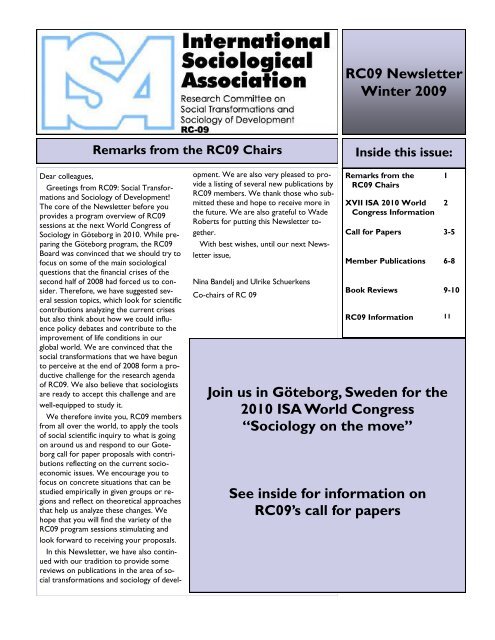
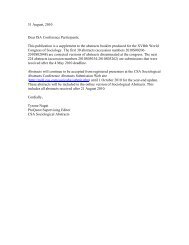
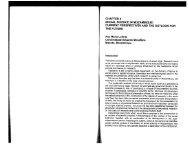
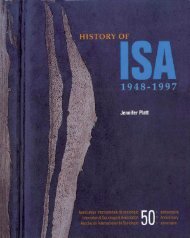
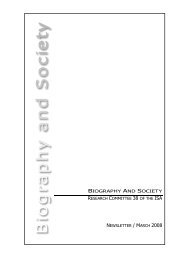
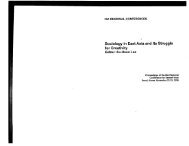

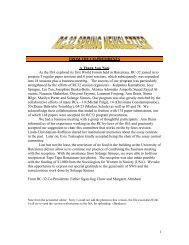
![Book of Abstracts [pdf 9MB] - International Sociological Association](https://img.yumpu.com/23520801/1/190x245/book-of-abstracts-pdf-9mb-international-sociological-association.jpg?quality=85)
